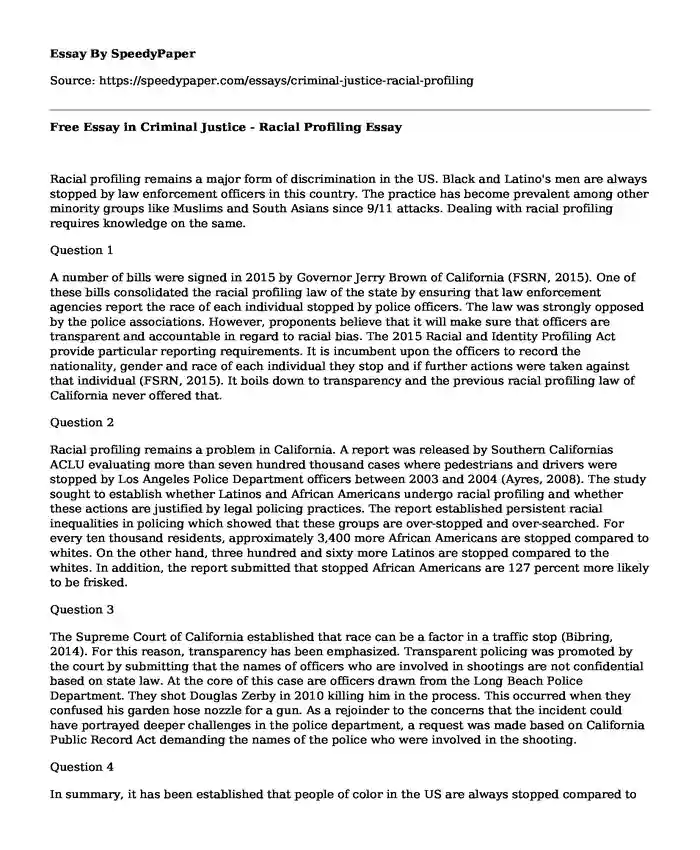
| Type of paper: | Essay |
| Categories: | Racism Discrimination Criminal justice |
| Pages: | 3 |
| Wordcount: | 645 words |
Racial profiling remains a major form of discrimination in the US. Black and Latino's men are always stopped by law enforcement officers in this country. The practice has become prevalent among other minority groups like Muslims and South Asians since 9/11 attacks. Dealing with racial profiling requires knowledge on the same.
Question 1
A number of bills were signed in 2015 by Governor Jerry Brown of California (FSRN, 2015). One of these bills consolidated the racial profiling law of the state by ensuring that law enforcement agencies report the race of each individual stopped by police officers. The law was strongly opposed by the police associations. However, proponents believe that it will make sure that officers are transparent and accountable in regard to racial bias. The 2015 Racial and Identity Profiling Act provide particular reporting requirements. It is incumbent upon the officers to record the nationality, gender and race of each individual they stop and if further actions were taken against that individual (FSRN, 2015). It boils down to transparency and the previous racial profiling law of California never offered that.
Question 2
Racial profiling remains a problem in California. A report was released by Southern Californias ACLU evaluating more than seven hundred thousand cases where pedestrians and drivers were stopped by Los Angeles Police Department officers between 2003 and 2004 (Ayres, 2008). The study sought to establish whether Latinos and African Americans undergo racial profiling and whether these actions are justified by legal policing practices. The report established persistent racial inequalities in policing which showed that these groups are over-stopped and over-searched. For every ten thousand residents, approximately 3,400 more African Americans are stopped compared to whites. On the other hand, three hundred and sixty more Latinos are stopped compared to the whites. In addition, the report submitted that stopped African Americans are 127 percent more likely to be frisked.
Question 3
The Supreme Court of California established that race can be a factor in a traffic stop (Bibring, 2014). For this reason, transparency has been emphasized. Transparent policing was promoted by the court by submitting that the names of officers who are involved in shootings are not confidential based on state law. At the core of this case are officers drawn from the Long Beach Police Department. They shot Douglas Zerby in 2010 killing him in the process. This occurred when they confused his garden hose nozzle for a gun. As a rejoinder to the concerns that the incident could have portrayed deeper challenges in the police department, a request was made based on California Public Record Act demanding the names of the police who were involved in the shooting.
Question 4
In summary, it has been established that people of color in the US are always stopped compared to the whites. A study carried out by Pew Research Center established major variations between black and white Americans as regards the manner in which they perceive the present state of race relations and their daily experiences of life. About 6 in 10 blacks reported that there are poor race relations (Stepler, 2016). A separate study founded on the Police-Public Contact Survey established that a lower number of white drivers (2 percent) stopped by law enforcement officers in 2011 were searched compared to six percent and seven percent of Black and Hispanic drivers respectively (BJS, 2016). The country must put more effort to address this problem.
References
Ayres, I. (2008). Racial profiling in L.A.: the numbers don't lie. Retrieved from http://articles.latimes.com/2008/oct/23/opinion/oe-ayres23
Bibring, P. (2014). California Supreme Court rules for police transparency. Retrieved from https://www.aclunc.org/blog/california-supreme-court-rules-police-transparency
Bureau of Justice Statistics {BJS}. (2016). Traffic stops. Retrieved from http://www.bjs.gov/index.cfm?ty=tp&tid=702
Free Speech Radio News {FSRN}. (2015). California law aims to identify and reduce racial profiling in police encounters. Retrieved from https://fsrn.org/2015/10/california-law-aims-to-identify-and-reduce-racial-profiling-in-police-encounters/
Stepler, R. (2016). 5 key takeaways about views of race and inequality in America. Retrieved from http://www.pewresearch.org/fact-tank/2016/06/27/key-takeaways-race-and-inequality/
Cite this page
Free Essay in Criminal Justice - Racial Profiling. (2019, Dec 02). Retrieved from https://speedypaper.com/essays/criminal-justice-racial-profiling
Request Removal
If you are the original author of this essay and no longer wish to have it published on the SpeedyPaper website, please click below to request its removal:
- Essay Example Describing the Nature of Social Mobility
- Essay Example with a School Profile
- Essay Example on Fayol's Principles of Management
- Minority Civil Rights Movements, Essay Sample
- Strengths and Weaknesses of the New Deal, Essay Example in American History
- Jaqueline - Personal Essay Example
- Free Essay: Fundamental Differences Between the Structure and Investment Philosophies
Popular categories




